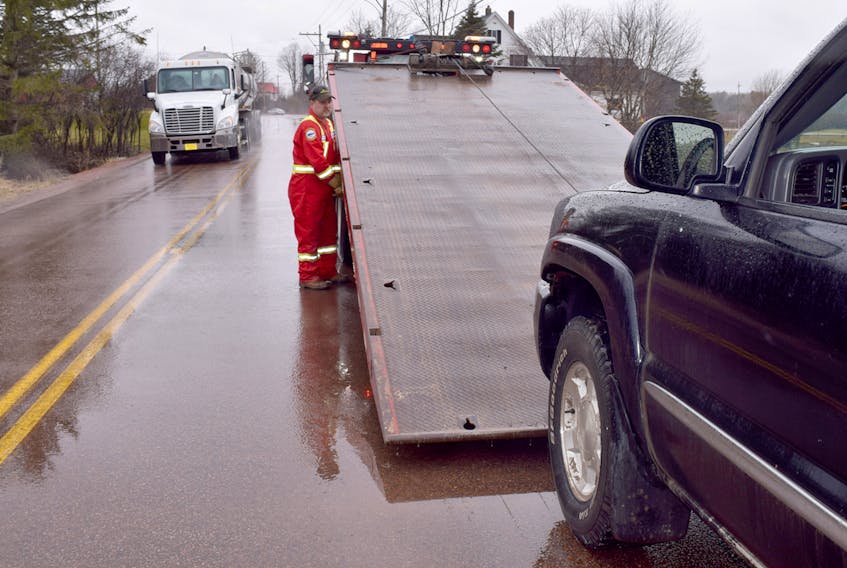TRURO, N.S. – Bradley Crowe remembers an incident along Highway 102 where he came within inches of losing his life.
“It was clear and there was a Department of Transportation vehicle set up at the top of the hill with a light board on to warn people of this disabled vehicle that I was picking up,” Crowe said. “And this SUV came by within inches of me doing highway speed. If he had hit me it would’ve been over ... and he had lots of warning.”
That’s one reason Crowe, of B. Crowe Towing and Recovery in Valley, and other tow truck operators are lauding an amendment to the province’s Move Over Law.
“It’s very necessary. It’s a good step in the right direction as long as people abide by it,” said Crowe. “It will help.”
Legislation passed in Province House last week will serve to protect tow truck operators, along with law enforcement officers and first responders. The law requires drivers to slow down and change lanes when police have a vehicle pulled over or when first responders are stopped at a roadside emergency. Previous legislation only included police, EHS vehicles and fire response vehicles.
The bill was put forward by Dave Wilson, NDP MLA for Sackville Cobequid. Although the legislation has passed third reading, it still has to be passed into law by the government.
And while Wilson acknowledged enforcement of the law will depend on police being at the scene, he hopes awareness will serve as a deterrent.
“I mean it would be great to be able to say you’d be able to charge everybody but that just doesn’t happen,” Wilson said. “But, definitely, if there is a police vehicle in the area and they witness that you don’t abide by it, where you don’t slow down, you don’t move over, then you will be charged.”
Crowe estimated half of the drivers who pass by him when he is involved in a roadside tow operation fail to either move over or slow down, showing no regard for a potentially dangerous situation.
“They see the lights, they see the truck but they don’t care. They don’t get over,” he said. “And there’s so many excuses. They blame it on everything. If you are on a straight stretch for a kilometre, they wait until they’re 20 feet from you and then try to get over and then there’s a vehicle beside them. So, then they say they couldn’t get over, there’s a vehicle there.”
The province’s Move Over Law has been in effect since May 2010 for police and other first responders.
Officially known as an Act to Increase Safety for First Responders and Others, the law makes it an offence to drive above 60 km/h or the posted speed limit – the lesser of the two – when passing a stopped vehicle with emergency lights on. Motorists are also required to change lanes to the lane farthest from the stopped emergency vehicle, if that lane is free and it is safe to do so.
“Nobody’s saying that you should slam on your brakes and create an unsafe environment,” Wilson said. “But the attempt to abide by the law, I think, is the main focus here that law enforcement are looking at.”
Conviction under the law brings a fine ranging from $352.50 to $2,442.50.
Crowe would also like to see Nova Scotia follow Saskatchewan’s lead by letting tow operators install blue flashing lights on their vehicles, similar to those on police cruisers.
“I think it would help because motorists would think that it is a cop up there and not a tow truck.”
But the best solution to such roadside woes would be for motorists to simply “read the road ahead,” he added.
“Just pay attention to the road when you are driving.”









